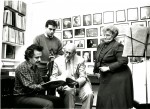Title
The week after commencement, Juilliard will host the eighth Starling-DeLay Symposium on Violin Studies. This five-day course of master classes, lectures, and workshops will be attended by some 200 violin teachers from 10 countries and 28 states. The biennial symposium is dedicated to fostering the legacy of longtime faculty member Dorothy DeLay (’42, violin)—and also to enhancing the pedagogy of these teachers. Faculty member Ray Iwazumi, who started studying with DeLay at the age of 12 and who was completing his doctorate here when she died, in 2002, reflected on his teacher.
Body
Dorothy DeLay’s remarkable legacy continues to be felt deeply at Juilliard both at the symposium and throughout the school year as many of her associates, colleagues, and students are now on the faculty. It’s also kept alive through various media. Nadja Salerno-Sonnenberg (Pre-College ’78; Diploma ’80, Professional Studies ’82, violin) said that DeLay “was teaching me to teach myself—and that’s why she is a great teacher.” She was speaking to Barbara Lourie Sand, author of Teaching Genius: Dorothy DeLay and the Making of a Musician (2000). Conductor Peter Oundjian (B.M. and M.M. ’81, violin) told Sand that part of DeLay’s genius was “to put people in the frame of mind where they can do their best.”
Itzhak Perlman (Pre-College ’63; ’68, violin; faculty) and Robert McDuffie (Pre-College ’76; Diploma ’81, violin) each described DeLay as a “full-service teacher,” pointing to her level of involvement in her students’ lives beyond the studio. It was no secret to anyone that she was the confidante of many of her students, a hands-on adviser for career matters, and also someone with tremendous influence over all types of professional possibilities.
On CBS News Sunday Morning in 1991, Dorothy DeLay said, “I find it very difficult to know in any kind of objective way what it is that I do.” Having known and studied with Miss DeLay (which was always how we addressed her) for almost 15 years, I can confidently say that she did not mean that remark in any mystic or ironic way. She was simply being frank and admitting honestly to what she did not know. And in listening to those words again 13 years after her death, I believe that her willingness to face her own vulnerabilities and limitations in such a matter-of-fact way is a reflection of the qualities that enabled her, as a teacher and mentor, to have such a powerful impact on her students.
Personally, I will never forget the genuine warmth with which Miss DeLay encouraged me when, as I was completing my master’s degree with her, I relayed to her my wish to study abroad with Igor Oistrakh. During my residence in Brussels, she and I exchanged letters; she kept me up to date with Juilliard news while telling me how happy she was for me that I was studying outside her studio. Her humility and open mind were extraordinary. Once, in response to my somewhat impudent remarks about different ideas in technique (i.e., different from hers!) that I had been exploring with Oistrakh, she wrote, “I am getting some new ideas, which are fascinating me. I will show them to you when you get back. I would love to have your opinion.” Likewise, her enthusiasm for my work touched Oistrakh as well. Soon, I found myself privileged to study nearly simultaneously with this exceptional pair of mentors united in the interest of my development. And it was with open arms and smiles that she received me when I returned to her studio at Juilliard as well as that of Hyo Kang’s (Diploma ’77, Postgraduate Diploma ’78, violin) to pursue my doctorate.
DeLay was inquisitive, certainly very knowledgeable on matters violin (and beyond), patient, and knew how the power of words could change lives. On more than one occasion, she went on record about a key principle she received from her father, who was a school superintendent. “Before you say anything censorious about anyone, ask yourself three questions: Is it true? Is it kind? Is it necessary? If the answer to any one of these is even a qualified no, you’d best be quiet.” That guiding rule was certainly part of what made her so magical to so many people.





